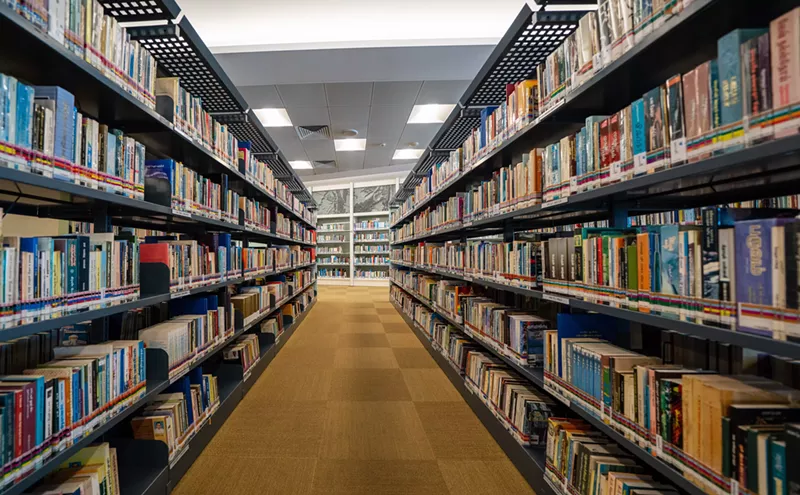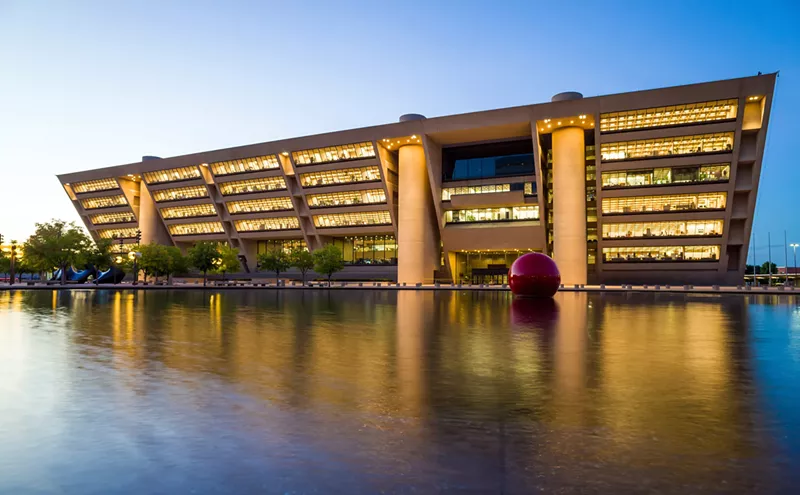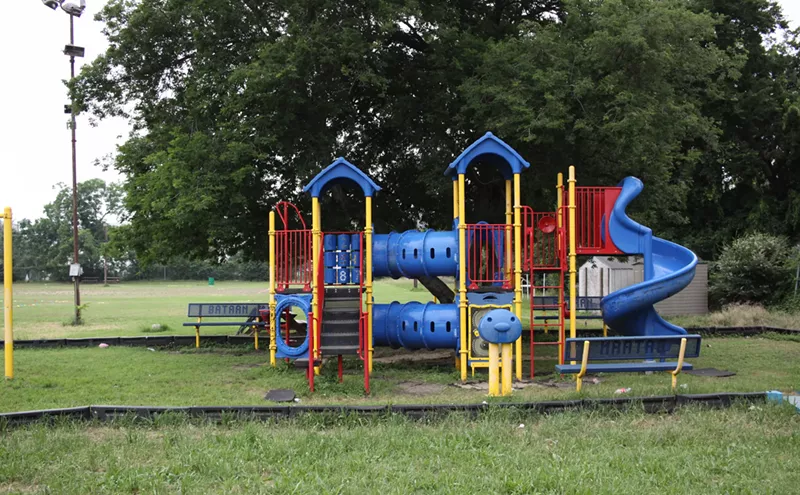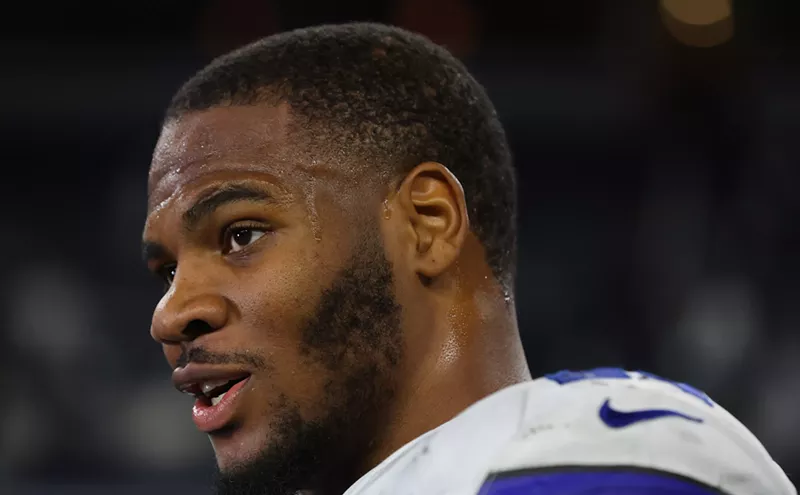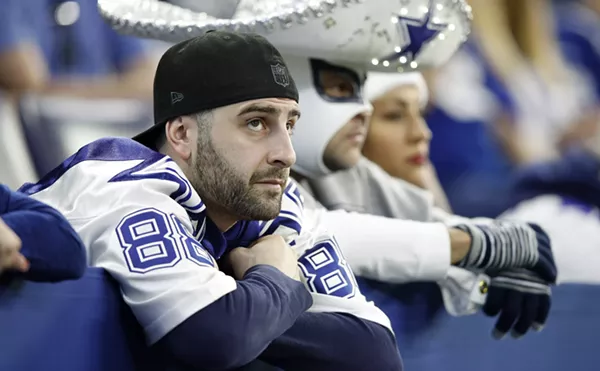Their camcorders and phones recording, about 10 cop-watchers stand on an embankment between six busy lanes and four gas pumps at an Arlington gas station, wondering why cops keep coming for what looks like a simple traffic stop. Don't all these cops have something better to do, they think, like fighting crime?
Three Arlington officers get out of their squad cars and form a loose wall between the officer conducting the stop and those recording. "Get back," an officer says. "Get back." The cop-watchers look at each other in confusion. Get back? Why?
Why is there backup here at all? The group of self-appointed police monitors has been driving up and down Arlington's Cooper Street, a stretch of blacktop sidelined by fast-food joints and strip malls, and taping traffic stops for months. There's a script: Listen to the police scanner, drive toward one, park, record and upload the videos to YouTube when the night's over. Repeat.
Sure, cop-watchers have gone off script occasionally. Jacob Cordova tried to make a citizen's arrest of a double-parked officer; Joseph Tye chased down one cop for speeding while not responding to a call, then confronted him in a parking lot. "Shiny pieces of tin" don't grant "extra rights," Tye likes to say, and it's up to those who guard the guardians -- him and his pals -- to hold the Arlington police accountable and make sure they don't infringe on people's rights.
Up until this August night, though, the officers seemed OK with being recorded (the Arlington police chief would tell Fox 4 as much). There were even some friendly conversations, and the watchers soon began to recognize faces and learn names. Tonight, though, someone has rewritten the script.
Cordova keeps his phone at eye level as he records the original officer on scene. For him, there's bad blood there. She wrote him a $180 ticket once for "illegal use of a horn." He still doesn't know why and plans to fight the ticket in court. First that, now she calls backup? What's she trying to do? Why do these cop watches seem to be escalating? Cordova leans over and tells his friend and fellow activist Kory Watkins what he thinks the group should do.
"I say we follow her the rest of the night," he says. "She's the one who'll pull the trigger on us."
Cordova's white, two-door Cadillac is acting up again. He's thinking about replacing the car he had sent with him to Italy while he served in the Air Force, but his dad's will have to do tonight. He pulls into the Home Depot parking lot where a group of cop-watchers waits in an informal circle. It's the last Saturday in August, a warm and buggy night. Six Flags Over Texas is down the road, and Cooper Street, their usual patrol route, is a few turns away. Cordova parks and joins more than 20 people. Big group tonight, he thinks. Must be all the publicity.
The previous Tuesday, Fox 4 aired a report on the group's last cop watch, in which the officer had called for backup. It ended without incident, only hinting at what would await the cop-watchers tonight. The Fox reporter interviewed a former officer who chastised them for what she considered interference. The group considers the report a smear campaign, and to them it only serves to prove that their distrust of the media is well-placed.
One reason the report doesn't sit right is because it didn't say the First Amendment protects filming cops. Unless, of course, those filming interfere. But exactly what constitutes "interference" is a fuzzy area. No hard rule exists for how far cop-watchers have to keep away from the action. Legally, a reasonable distance is what a reasonable person would consider a reasonable distance. The cop-watchers believe they stay on that side of the line, even if they do sometimes toe it.
Cordova started one of the organizations out tonight. He saw videos of the cop-watches Antonio Buehler had in Austin under the name Peaceful Streets Project. Cordova reached out. With his friend Watkins, president of the pro-gun group Open Carry Tarrant County, they went on their first cop-watch as the Tarrant County Peaceful Streets Project.
The other is Texas Cop Block. Joseph Tye, who confronted the speeding officer, is the administrator on the group's Facebook page. It's one of hundreds of groups around the country affiliated with CopBlock.org, which went live in 2010 and is now run by a former intern at the Cato Institute, the libertarian think-tank. Cop Block is decentralized; anyone can host cop watches under the Cop Block name. There are kids in it for the rush, and then there are the hardcore, such as Tye, who is in it because he believes it's the right thing to do.
Because he sees several first-timers, Cordova addresses the group. He sports a buzz cut and a patchy beard. A Ron Paul 2012 shirt with the sleeves cut off expose his muscular arms. In the circle, he stands across from Watkins. A beanstalk with a face of right angles, Watkins has already put on the fluorescent safety vest many cop-watchers wear so the cops know where they are. He dons a body camera. Standing close to Cordova, Tye wears a blue collared shirt with the Cop Block logo -- a video camera trained on a smiling cop's face -- and an Open Carry Texas hat. He strokes his thick black beard absentmindedly.
Unlike what the media say, Cordova says, his group doesn't interfere with traffic stops. Also, he says, they don't hate cops; they only film to hold them accountable and make sure they don't violate people's rights.
The Arlington Police Department reached out to Cordova and requested a meeting, but, after conferring with Buehler, he declined. He forwarded an email to the department's media relations person that Buehler had drafted, saying the group preferred direct action and working within communities to solve the problem of police abuse. "As such," the email read in part, "the Peaceful Streets project seeks to ensure a safe and secure environment for victims [of police abuse] by refusing to allow law enforcement agencies, officials or their representatives from participating in Peaceful Streets Project actions or events. Further, the Peaceful Streets Project will ensure the trust of these victims of police abuse by not working with or supporting any coalitions involving law enforcement agencies, officials or their representatives acting in their official capacity."
After Cordova's speech, Watkins directs those who aren't driving to download the app that will turn their phones into walkie-talkies as they patrol the Arlington streets. While Tye lived in Weatherford, he hosted small cop watches there, but those in Arlington attract the most people. (Dallas Cop Block consists of one man, Jose Vela, and he has trouble getting others out with him.) A lot of cops here, the group believes, are bad.
Many cop-watchers are also Open Carry activists. (Liberty is popular among intelligent people, Tye would say.) When Arlington passed an ordinance banning handing out political literature at busy intersections, Open Carry Tarrant County sued the city and won. It was a bad law, the cop-watchers feel, but the police still enforced it. If they enforce that, what won't they enforce? If activists didn't fight for that right to hand out pocket Constitutions, what other, bigger rights would the government think it could take away next?
The group figures out seating arrangements, three or four to a vehicle. As usual, Watkins sits shotgun while Cordova drives. A new guy joins Tye and his wife, Bryanne, in their blue sedan. With Cordova leading the caravan, the cop-watchers head off the lot, toward Cooper Street.
A Monster energy drink's sickly sweet aroma fills Tye's car. He's already photographed four traffic stops, and he needs to stay focused for what looks to be a late, exciting night. Each stop seems tenser than the last. Backup officers have been called to each one; cops have formed their wall. Tye leaves a convenience store's parking lot and turns on Cooper.
A week ago, right before classes commenced at the University of North Texas, Tye and Bryanne moved to Denton so he could begin work on his computer science degree, paid for by the GI Bill. Tye enlisted in 2001 and toured Iraq twice. He thought he was doing the right thing, defending people's rights. He followed orders, believing he could trust authority. But he saw friends go home in body bags because, the way he saw it, a commander had bumbled. Then he discovered Ron Paul.
To Tye, the libertarian idol made a lot of sense. The government was too big, too wasteful, he now believed. He began wondering how much government intrusion was too much. His conclusion -- any amount was too much -- brought him to voluntaryism, a philosophy that essentially states all human interaction should be voluntary. Therefore, this line of thinking goes, the government is a coercive mechanism and taxation is theft. He'd left for Iraq hoping to protect people's rights by serving the government, but now he believed the government wasn't a force for good.
After he got out in 2009, Tye came across CopBlock.org, which is devoted to voluntaryist ideals and a way to express them. The site's mission attracted him because after he realized government intrusion was bad on a grand scale, he realized it was bad on a small scale -- traffic stops. Unlike several Arlington cop-watchers, the origin of Tye's animosity isn't isolated to a single incident. (Bryanne remembers one day when she was 7, alone in her home, when a cop talked his way in and rummaged through her underwear drawer.)
He met Bryanne through a Cop Block Facebook group, and she moved to Texas when things got serious. When Tye took over Texas Cop Block from another guy, he hooked up with Watkins and Cordova.
On his right, he sees the flashes he's been looking for. He parks on a narrow lot near where the cops have pulled someone over. A camera slung over his neck, he hustles over. Cordova, Watkins and the others are already here. Tye sees they've positioned themselves on the sidewalk and next to the building's entrance. Officers have formed a ring around the stop.
Tye joins one cop-watcher, who wears a shirt that reads "Stay Calm and Film the Police," near the building's far corner. Tye recognizes the officers from previous stops. A stocky, bald cop stands inside the ring of officers. As vehicles zoom past, minutes drag by. Then a woman's voice breaks in.
"I understand you are mad, but they do their job," the woman yells at the cop-watchers as she stands on her SUV's running board and waves her finger. She idles in a driveway next to the stop. "The way you are protesting is not good."
The cop-watchers turn their heads from the police to her. Tye and most of the others gather by her passenger's side door. They train their cameras on her.
"Who's going to protect us?" she asks. "You're not protecting. You're making it worse. One cop does not mean every cop is bad."
Tye steps forward and points his finger. He's not out here because of one cop; he's out here because he believes the institution is flawed.
"The law don't make it right!" he shouts.
In a huff, he walks toward his car.
"That's what you think!" the woman shouts back before driving away.
The interaction disconcerts Tye. Usually, bystanders are supportive when they encounter a cop-watch (as one will say tonight, summing up many people's reactions, "That's crazy; that's good, though"). Online is a different matter; criticism runs rampant. When critics argue that the cops are enforcing the law, Tye thinks of a favorite quote from Martin Luther King Jr., from his "Letter from Birmingham Jail": "We should never forget that everything Adolf Hitler did in Germany was 'legal.'" He quotes it as he walks to his car.
The stop completed, the officers have left. Tye gets back in his car and starts it up. He follows the others down Cooper. He burns through gasoline. Tye is the caravan's caboose, and as he arrives at a convenience store's small lot, the others have stationed themselves on the raised sidewalk next to the entrance.
Directly in front of the two swinging doors, an officer puts a pickup's driver through a sobriety test. Several officers have formed a semicircle around the stop, creating a perimeter around all but the raised sidewalk. Tye parks and grabs his sign that reads "Don't Consent to Searches" from the backseat. He walks toward the entrance.
"Sir," the officer closest to him says, "don't go past that sidewalk."
She points where she wants him to stop, but Tye steps up from the asphalt to the raised sidewalk. Two officers converge on Tye, their hands on their hips, their chests out.
Tye doesn't alter his cadence. Sidestepping the officers, he opens the store's door and walks inside. The two officers look at each other and then step back down to the blacktop. A few moments later, Tye comes out and joins the others. Cordova walks around the perimeter, his phone in one hand and a smoldering cigarette in the other.
As the traffic stop continues, the same two officers approach Tye again. They try talking to him, but he won't hear it. "Arrest me," he tells them, then louder as they turn their backs. "Arrest me!"
Just in case that does happen, Tye carries a blank, signed check, attached to a bank account with a chunk of money.
Ten squad cars are squeezed into the lot.
"You smell bacon?" one cop-watcher asks, rhetorically. As the sobriety test continues, she reads the Fourth Amendment from a pocket Constitution.
After more than 20 minutes, the pulled-over driver is handcuffed and put in the back of a squad car. The officers drive away.
A group of preteens walks to the store's door, and a cop-watcher shouts, "Future cop-watchers right here!"
"Always film the police," says one cop-watcher. "They are trained not to trust you," says another. Another hands out pocket Constitutions.
After educating the next generation, the cop-watchers get in their cars and take off. Tye sips his Monster. He's only been to a week of classes, but already he can tell the high-level calculus will cause many late nights, many long weekends. He wants to cop watch as much as he can, but he doesn't know if he'll have the time.
Around 1 a.m., the cop-watchers stop at Whataburger. Tye orders and sits opposite Bryanne at a white table. The group clusters together as they eat. Then Tye sees Watkins shoot up from his seat. Apparently, he saw flashing red-and-blue lights.
"They're like, 'We have five minutes to get everyone!'" Watkins says.
The group laughs. Who's to say the cops aren't taking advantage of the group's break, rounding people up when they're not there to film? Watkins walks toward the door, turns around and holds up his phone. Time for a group photo. The cop-watchers put their hands up, as if someone were pointing a gun at them. As Watkins snaps the picture, they say, "Hands up, don't shoot."
Back in the car, Tye sips more Monster. An hour passes, and Cordova's voice breaks in over the walkie-talkie app. He's calling it. It's been a particularly busy night, and they've been at it for five hours. Tye wants to continue, though.
Arlington's streets are nearly deserted now and Tye has wandered from Cooper, but he finds what he's looking for. He parks right across the two-lane street from the stop. A man sits on the curbside, his hands behind his back. Two squad cars are parked behind his truck, and two officers stand on either side of him. Tye gets out of his car and walks toward his trunk. The officers' heads snap toward Tye.
Then one turns back to the sitting man. "I'll tell you what," Tye hears the officer say, but the rest is lost to the night. As the man looks from the officer to Tye and back to the officer, his expression changes from one of anguish to one of surprise. He gives Tye a goofy smile as he stands up and ambles back to his truck.
The officers walk back to their cars. The man waves at Tye as he drives away.
As Cordova pulls into the Home Depot parking lot the following Thursday, he knows tonight's cop watch won't have the numbers Saturday's did. Many have work in the morning, and Tye is stuck studying. But Watkins, who trains bartenders, will be here. Cordova parks. Including him, seven people have shown up.
Even though he juggles working at a Costco and studying for a business management degree at the University of Texas-Arlington, Cordova tries to make it to as many cop watches as possible. If he or Watkins didn't show, he knows, most people wouldn't come. Also active in Open Carry Tarrant County, he met Watkins through the Ron Paul movement.
Cordova served three and a half years in the Air Force. A staff sergeant gave him a copy of Ron Paul's book The Revolution: A Manifesto, and it opened his eyes. Paul's logo -- the "revolution" with "love" spelled backward in red -- adorns his right forearm. After reading the book, he realized how important the Constitution was, and how the country was moving away from its principles.
With Watkins sitting shotgun, Cordova heads to Cooper Street. After what happened this past Saturday, he doesn't know what to expect. The tension has increased, but they were only recording. What right did the officers have to try to prevent them from doing that? Cordova turns onto Cooper.
If the officers do try to stop them, he thinks, they'll only expose themselves for what they are: breakers of their oath to uphold the Constitution.
Cordova sees a traffic stop at the corner of Cooper and a residential offshoot. He parks up the road, and he, Watkins and a new guy get out. Cordova sees four people walk the sidewalk next to the stop, and then he sees Watkins head the same way. Cordova stays put, until he sees Watkins stopped.
Cordova watches three officers detain his friend. One handcuffs him, and another puts his black-powder pistol, an antique gun that's legal to openly carry under Texas law, in a nearby squad car's trunk. Cordova can hear Watkins shouting that he's being illegally detained.
Cordova wonders why he was stopped. People walked there right before Watkins did. Cordova tries to get closer, but three officers stop him about 50 feet away. About 15 minutes pass, and Watkins' hands are released. An officer returns his pistol. Watkins' body camera records the whole time. He meets up with Cordova, and they get back in their car. It's escalating, Cordova thinks. What could happen next?
Cordova turns his Cadillac south on Cooper. As he approaches a red light, he gets in the right turn lane. The other car full of cop-watchers is in the middle lane, an Arlington squad car on its tail. Cordova turns right. There are no cars behind the other cop-watchers so the driver angles into the right lane. The light turns green, and he follows Cordova. The officer turns his lights on.
The driver pulls into a Half Price Books parking lot, and Cordova finds a spot close by. As he and Watkins step out, more squad cars arrive. With expressionless faces, the officers form their wall. The bald officer from Saturday walks to the driver's window. Cordova hears him say the driver was pulled over for crossing a solid white line, and he watches as another officer opens the passenger's door and tells another cop-watcher to get his hands up.
"Would you get out of the way so I can film?" Cordova asks the officer in front of him. His phone horizontal at face level, Cordova films the stop. This is insane, he thinks. Why are they getting everyone out of the car for a simple traffic stop?
Watkins counts off the squad cars. One, two, three, four, five, six.
This is a police state, Cordova thinks. He asks the cops if they've ever read 1984. "This is Big Brother shit right here!" Cordova yells.
Officers search the car with the driver and three passengers out of it.
"So everyone's been detained for what?" Watkins asks. "Not turning on your blinker?"
"Basically," one passenger answers. "They say we crossed a white line."
Cordova is incensed. The Constitution doesn't allow this, he thinks. He taunts the officers, mimicking them making a traffic stop. He moves closer to Watkins.
"We don't hate police officers," Cordova tells the cops forming the wall. "We just want to hold them accountable. We are peaceful. We never harm them. We don't ever get in any of their ways."
The officers don't respond. Cordova holds up his military ID. He came back from overseas for this? A police state? He defended liberty in Iraq, and now he's defending liberty in Arlington?
"Why don't you like this military ID right here?" he asks the officers. "Is it because I swore an oath to protect it from tyrants like you right now? Could be. Could be."
Eventually, the bald officer tickets the driver for failing to maintain a single lane, and the officers drive away. Cordova and crew head back to Home Depot. If they wouldn't exert their authoritarianism, Cordova thinks, he wouldn't have to be out here. But tonight has only proven that the cop-watchers are in the right place. They need to have a cop watch Saturday, Cordova decides.
He drives home. What could the police possibly do Saturday that they haven't done tonight?
Watkins pulls into a parking space close to a circle of cop-watchers. They're in a different Home Depot lot, right off Cooper Street. It's Saturday, September 6. The members have agreed not to talk to -- or at -- the cops tonight. Throw them off balance, they reason.
Watkins wraps a fluorescent safety vest over his Notre Dame T-shirt. Raised Catholic, he doesn't claim a particular religion now, though he's still a God-fearing man. When he watches or reads media reports that belittle him, or when officers detain him, he turns to God. Those people are just trying to scare him off, to make him stop fighting for liberty, but he puts himself in God's hands.
The group figures out seating arrangements. Watkins takes his usual place, shotgun in Cordova's Cadillac, and Watkins' wife, Janie Lucero, sits behind them. Cordova heads north on Cooper toward where the group knows the cops set up a speed trap. Cordova wears his "Orwell shirt," as he calls it -- black with white lettering, "WAR IS PEACE, FREEDOM IS SLAVERY, IGNORANCE IS STRENGTH." Listening to his police scanner app, Watkins keeps his phone's speaker to his left ear.
As Cordova drives up and down Cooper, a thought hits Watkins: He hasn't seen this many squad cars out before.
"They're all out tonight," Cordova says.
"It's OK," Lucero says. "We are too."
Cordova makes a U-turn and heads south. On his right, Watkins spots a car pull off the road, a flashing squad car right behind. Cordova angles into the muddy lot and parks near the back, about 20 feet away. Cordova steps out into the mud. He pulls the seat back so Lucero can join him. Watkins leans over and watches from the car.
"Do not approach my stop," a voice crackles over the squad car's loudspeaker. "Do not get any closer than you already are."
Watkins sees an SUV with the department's logo drive up and park between the squad car and the Cadillac. A second squad car pulls up.
"Don't tell me what to do," Lucero says softly.
"That's right," Watkins breathes.
Cordova records the stop with his phone. The three police vehicles drive off without incident as Lucero and Cordova stoop down and get back in the Caddy.
Other than the loudspeaker and the backup, it was a pretty normal stop, Watkins thinks. If they were all like that, more or less, the group wouldn't have the numbers they have now. People would stop coming, and it might just be him and Cordova. It'd get boring, he thinks, but that doesn't necessarily mean he'd stop.
Until someone shone Ron Paul's light on him several years ago, Watkins wasn't one to be a delegate to the Republican National Convention, to carry a rifle into a Target or a government building, to film the police. But he was inquisitive, and, after he read Paul's words and watched Paul's videos, he began questioning the everyday life around him.
People waking up, getting dressed, going to work, paying their bills, paying their taxes, the same over and over -- he wondered if that is freedom. Under Paul's influence, when Watkins looked at the country, he saw a nation resembling one the Founding Fathers ran from: We aren't free; the government is actively circumventing the rights the Constitution gives us. Having the police detain him for wearing an antique firearm proves that.
In the Cadillac, Cordova gets a message: More cop-watchers needed down the street. He pulls onto Cooper, makes a U-turn and heads north. Watkins doesn't notice any squad cars on the way.
The stop is on their left, in a lot next to a Taco Casa. A white sedan's been pulled over, Watkins can see, and several cop-watchers have taken their place next to the building. The flashing lights of several squad cars bounce off the lot's puddles. Tye stands closest to the stop, about 20 feet away, on the sidewalk in front of the white sedan's headlights. Two officers stand near him. Tye's blue car is parked in the lot, having arrived when a single squad car was there, and Cordova jets across three lanes to join it.
He pulls into a back entrance, but a squad car drives toward his Cadillac and blocks the way. Watkins tells him to go around it. Cordova tries, but as he makes his move an officer gets out and stops him. He parks. The three cop-watchers exit the car and begin walking down the sidewalk.
"Stop," the officer tells them.
"It's a public sidewalk," Watkins replies.
If I don't stand up here, he thinks, then what else will they take from me? He decides to go as far down the sidewalk as he can without getting arrested. He and Lucero have two kids. Any jail time wouldn't be good.
Watkins continues down the sidewalk, wrapping around a street corner. Cordova and Lucero follow. Watkins eventually stops in the sloped part of the lot, where cars turn in and out. He's about 20 feet from Tye.
Watkins watches as the bald officer who pulled his friends over on Thursday walks up to Tye. "Step over there," the officer says, pointing to the corner. Watkins doesn't hear Tye say anything, and Tye doesn't move. The officer heads back to a group of squad cars.
Several minutes pass. Watkins remains camped out in the alleyway. He sees Tye take two steps away from the white sedan, but an officer taps his arm, stopping him. They exchange words. Then the bald officer comes up behind him.
"Put your hands behind your back for me," he tells Tye.
Several other officers converge on Tye, and the bald officer handcuffs him. Watkins watches as he escorts Tye to a squad car. He hears a commotion to his left -- officers trying to wrangle the cop-watchers toward the building's corner.
"That is the area to film," one says, "get to the sidewalk, please." The cop-watchers move back, protesting. What's going on? Watkins thinks. They've never been moved back like this before. "Do not move back past me," another officer says. "Film over there."
"What the fuck is y'all's problem tonight?" Watkins hears a cop-watcher ask.
Cordova tells the officer he needs to use the sidewalk to get to Taco Casa, to use the restroom. The officer tells the three of them to stay put. A few moments later, another says, "Clear the alleyway, please."
Another squad car has turned across three lanes of oncoming traffic -- it's around 10:30 so Cooper Street is still pretty busy -- and comes in at a 45-degree angle to where the three cop-watchers have been camped out for several minutes. The car's horn blares as it comes up on Watkins and Lucero. It stops short of Lucero, who's a short stick of a woman, by about two feet, but Watkins reacts differently. As the car comes to a stop, he turns around, sees it and tries to grab his wife out of harm's way.
"You fucking serious motherfucker?" he yells, his voice piercing the night air. He poses like a linebacker before the snap. "You about to hit my wife with your fucking car!"
He moves to the other side of the squad car's grill to stand between the officers and his wife, but they grab his arms and walk him toward the group of squad cars. He doesn't resist.
"You guys are pirates who are violating the Constitution," Watkins hears Cordova shout.
"Did you see what he was doing?" Lucero asks another officer. "He almost ran me over!"
Officers walk Watkins toward the lot's far side, where the squad cars have gathered. "I was trying to get to the other side because my wife was about to be hit by a car," he tells the officers holding his arms. At the cars, he squats down but continues to record. He can only hear the commotion on the lot's other side. Cop-watchers yell and curse.
The next thing he knows, his wife has her hands behind her back and is being put in a squad car.
The couple is put in separate squad cars and taken to the city jail. Watkins is told he's being charged with obstructing a highway and interfering with police duty. His phone, his body camera and a camcorder Cordova had given him are taken away. After changing into an orange jumpsuit, Watkins is placed in a large room with bunk beds and several bathrooms. His only other roommate is Tye, charged with interfering and failure to produce his ID, though he insists he showed them his blue military ID with a picture of him clean-shaven. Tye's blank check is in Denton.
About three hours later, around 1:30 a.m., Watkins, back in his Notre Dame shirt, walks out of the jail and into the waiting area. Cordova sits at a plastic table, and several other cop-watchers sit on a bench by the window. His friends clap.
Cordova explains his lawyer bonded him out and it's only a matter of time before Lucero and Tye walk through the door. Watkins inquires at the front desk about his black-powder pistol and his knife the police took from him, but he's told he'll have to get them a different day. Then Watkins heads to the street corner opposite the jail, where his cop-watch brothers are waving signs and flipping off passing squad cars. Watkins holds a sign for a few minutes, then returns to the waiting area.
Soon, Lucero walks out, and Watkins gives her a kiss, grateful he'll be going to sleep next to her and not Tye tonight. The cop-watchers examine the bruises on her arm. They take pictures with their phones. A little before 2 a.m., Tye emerges, to more applause.
Gathered in the waiting area, they have no intention to stop. If anything, to them, the arrests prove they're on the right track. The cops have only proven their role in an authoritarian state, and the cop-watchers have shown that a display of force won't scuttle their mission. The group heads back to their cars. They wanted to go cop-watching after their buddies got out, but it's late. It's time to get back home.
Cordova drives Watkins and Lucero back to Home Depot. Watkins reflects on the night. Getting arrested, he decides, might be the best thing. It'll expose the department's stupidity, he says. Cordova nods. A few moments of silence pass by.
"Crazy fucking world we live in," Watkins says. "I just got kidnapped for walking down the fucking sidewalk."
Tye, Watkins and Lucero's court dates are in November. Though the Arlington Police Department didn't return several attempts for comment, Sergeant Jeffrey Houston told The Dallas Morning News the white sedan had to be let go because of the confrontation with the group. The cop-watchers arrested haven't gotten their phones and cameras back. Tye and Watkins got new phones. The very next Saturday, the cop-watchers returned to Cooper Street. Several who witnessed Saturday did not come out, but several new ones took their places.



